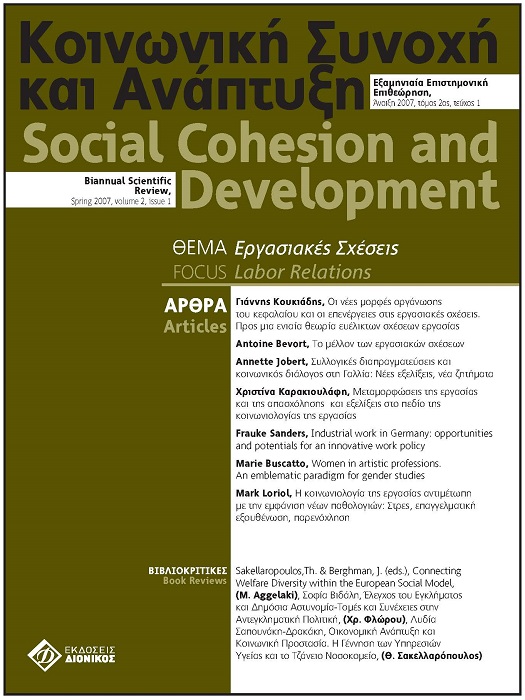Γυναίκες και καλλιτεχνική εργασία. Ένα εμβληματικό παράδειγμα για τις σπουδές φύλου
Abstract
Στις αρχές του 21ου αιώνα τα όρια μεταξύ των δύο φύλων στον χώρο της εργασίας δεν έχουν ακόμα καταργηθεί. Μετατέθηκαν, ανασυντέθηκαν, με βάση νέες διαχωριστικές γραμμές. Ένας «οριζόντιος διαχωρισμός» κατανέμει τους άνδρες μεταξύ γυναικείων και ανδρικών επαγγελμάτων. Ακόμα και εάν έχουν την ίδια κατάρτιση, οι γυναίκες αμείβονται λιγότερο από τους άνδρες συναδέλφους τους. Ένας «κάθετος διαχωρισμός» καθιστά την πρόσβαση των γυναικών σε διαπρεπείς εργασίες πιο δύσκολη σε σχέση με τους άντρες. Πώς μπορούν να εξηγηθούν αυτές οι διαφορές; Βασιζόμενο στο εμβληματικό παράδειγμα της καλλιτεχνικής εργασίας, το παρόν άρθρο σχολιάζει βασικές αναλύσεις που αναπτύχθηκαν στο πλαίσιο των σπουδών για το φύλο τα τελευταία 20 χρόνια. Με βάση την έρευνα που διεξήγαγε η συγγραφέας για τις Γαλλίδες στον χώρο της τζαζ, αναλύονται και ελέγχονται οι βασικές γαλλικές και αγγλοσαξονικές θεωρίες για τις σχέσεις φύλου και εργασίας.
Article Details
- Zitationsvorschlag
-
Buscatto, M. (2016). Γυναίκες και καλλιτεχνική εργασία. Ένα εμβληματικό παράδειγμα για τις σπουδές φύλου. Social Cohesion and Development, 2(1), 69–77. https://doi.org/10.12681/scad.9040
- Rubrik
- Articles

Dieses Werk steht unter der Lizenz Creative Commons Namensnennung - Nicht-kommerziell - Weitergabe unter gleichen Bedingungen 4.0 International.
Authors who publish with this journal agree to the following terms:
- Authors retain copyright and grant the journal right of first publication with the work simultaneously licensed under a Creative Commons Attribution Non-Commercial License that allows others to share the work with an acknowledgement of the work's authorship and initial publication in this journal.
- Authors are able to enter into separate, additional contractual arrangements for the non-exclusive distribution of the journal's published version of the work (e.g. post it to an institutional repository or publish it in a book), with an acknowledgement of its initial publication in this journal.
- Authors are permitted and encouraged to post their work online (preferably in institutional repositories or on their website) prior to and during the submission process, as it can lead to productive exchanges, as well as earlier and greater citation of published work (See The Effect of Open Access).
Downloads
Keine Nutzungsdaten vorhanden.



